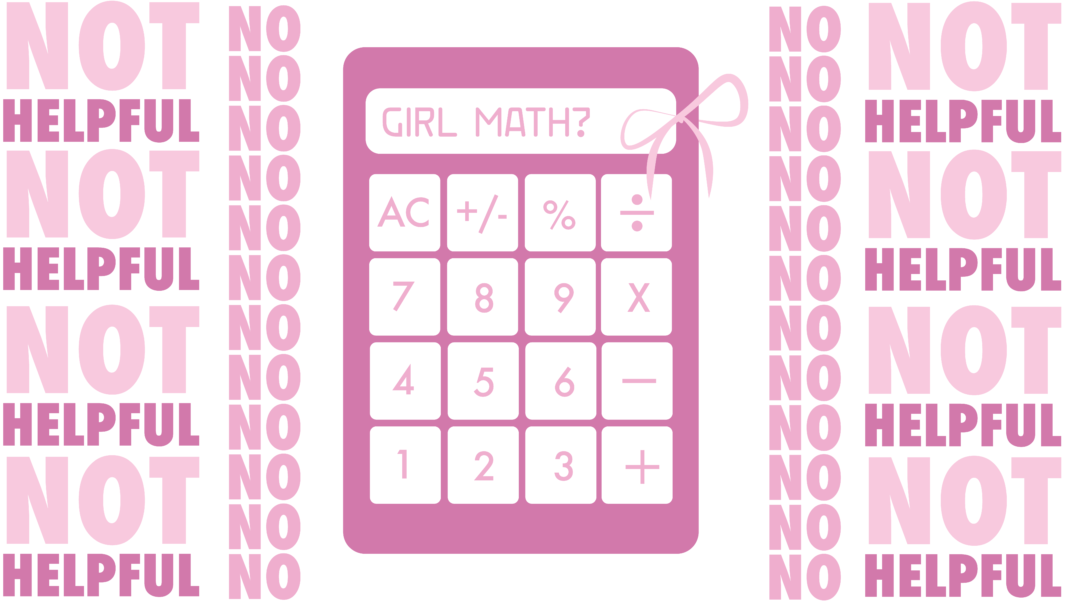TikTok trends are trendy for a reason: they’re relatable, short, entertaining bits of comfort that humanize us in a world where community is sought digitally.
While social media helps our generation learn to navigate young adulthood through shared experiences, it can also become so saturated that one trend can vary meanings from one day to the next, like “girl dinner” and its endless variations.
Social media is brimming with videos poking fun at “girl dinner” and “girl math”— informal terms referring to a lesser expectation of the way girls and women approach certain activities.
For example, “girl dinner” refers to plates with lighter, smaller portions of food based on the stereotype that girls are supposed to eat less or be more concerned with their weight than boys. At first, these videos were being circulated for fun. But, as internet jokes do, these girl qualifier ‘jokes’ quickly got out of hand, and have since evolved into a broader stereotype in regards to the way women approach life.
“Girl math” turned into the idea that girls aren’t as skilled in math as boys by implying that we take a more simplified, airheaded approach to the subject. While they appear to be innocuous terms on the surface, the core of popular “girl” trends like this one are subtly reinforcing the infantilization of women by perpetuating harmful stereotypes that limit our autonomy and potential as a whole.
Whether it’s “girl math,” “girl breakfast” or virtually any other phrase with the “girl” qualifier positioned before it, one thing is certain: despite being originally lighthearted, mockery remains mockery.
I’m no stranger to microtrends; in fact, I feel like I can associate memories from pivotal parts of my teenage years with what social media trend was popular at the time.
The effects that these fleeting trends can have on women, especially young women and girls, are long-term.
Research has found that the scale of association between social media and depressive symptoms was larger for girls than for boys, and that girls are more likely to experience negative mental effects from social media in regards to online harassment, sleep quality, and poor self-esteem. It doesn’t end there, as both young women and girls suffer the real-life consequences of subscribing to these harmful notions.
According to Lindsay Allen, a registered dietitian nutritionist, “Young women are especially prone to the negative effects because they are still developing and they need extra nutrition.” With adolescence being a major period of vulnerability in any woman’s life, it’s crucial that we remain conscious of the discourse we engage in online.
I’m not going to act like I’ve never mindlessly taken part in making jokes like this too, but at some point, we have to stop letting the internet mock us. It’s not helpful for women, nor is it conducive to everything feminist advocates have so fiercely advocated for in the past, like freedom with finances for example.
I don’t think these microtrends are created with malicious intent, but at the same time, we must examine the language we use when we engage with “girl” trends. Sharing discourse with other women online is a feminine pastime of the digital age. Subtly undermining the power of the female gender should not be.
By labeling activities with “girl” qualifiers, the implication is now that women need “special” or “simplified” versions of things, undermining our capabilities. By sending the message that women are not as competent as men in these areas, it’s discouraging, and leads to a self-fulfilling prophecy where women then avoid these subjects “not meant for them.”
It’s essential to think twice before sharing the things we see on social media and challenge them. While the world is gradually becoming more progressive towards women, women continue to be at a social disadvantage, and it’s our job to combat this.
It’s 2024, and now more than ever, it’s time to do our part in remaining conscious about the trends we’re subscribing to, the vocabulary we’re using daily and the harmful effects they can reap on our own community as women.







